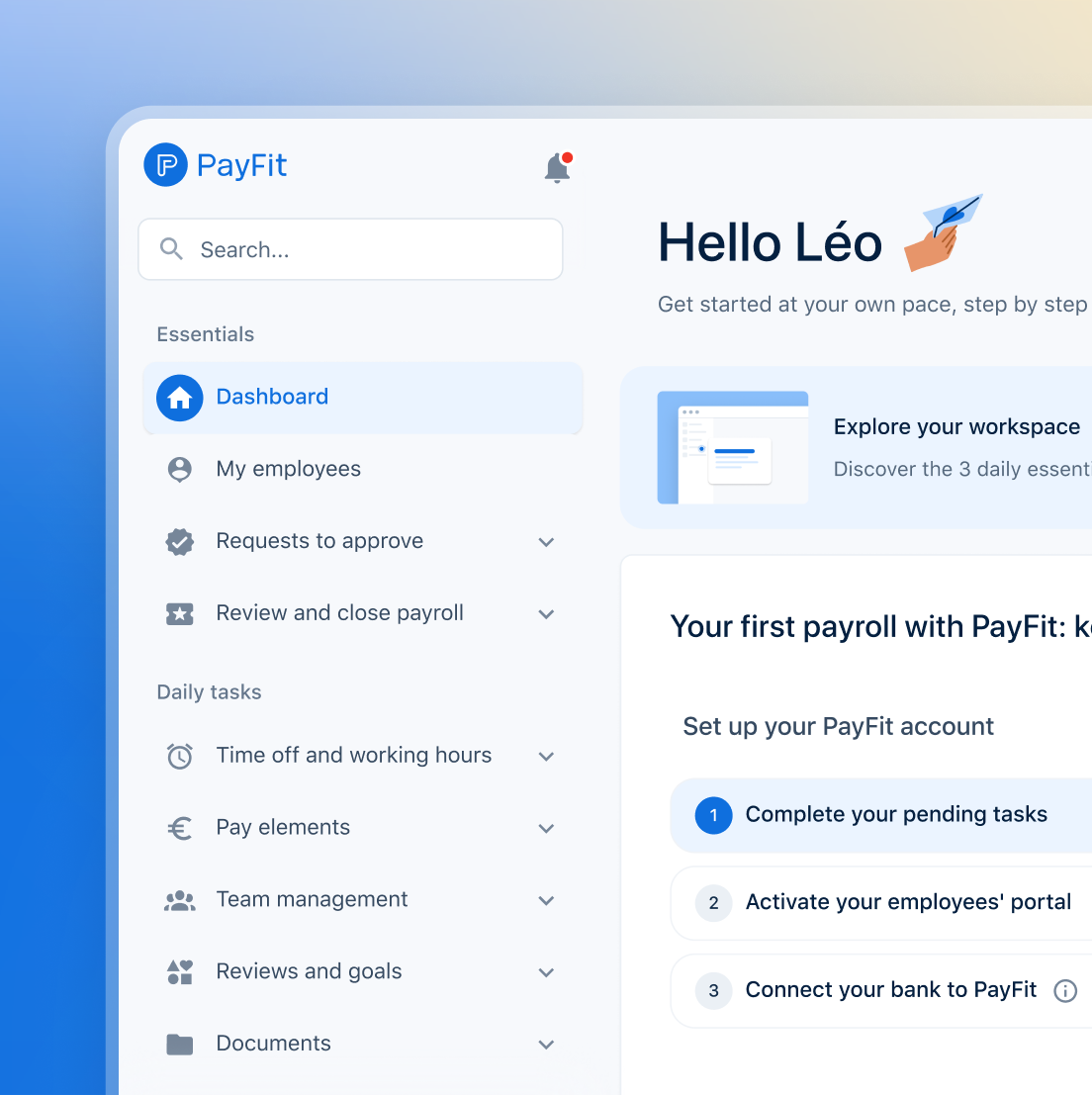✨ Health insurance, now in PayFit - learn more
💷 All the rates & thresholds you need to know for 25/26...right here
✨ The Payroll Journey: Start, Scale & Succeed Globally - learn more
✨ Health insurance, now in PayFit - learn more
💷 All the rates & thresholds you need to know for 25/26...right here
✨ The Payroll Journey: Start, Scale & Succeed Globally - learn more

Employee benefits are an excellent way of attracting talent, retaining staff and improving general wellbeing in the workplace. But what are the rules and regulations in place around them?
Here, we'll talk about employee benefits and how they work.
Employee benefits are incentives offered by companies. In most cases, the benefit itself comes at the employer's cost, either wholly or partially.
The reasons for offering employee benefits are numerous. Generally, they are used to attract new talent to a company, retain existing team members and boost wellbeing or morale in the workforce.
A 2019 study by Willis Towers Watson found that 75% of employees are more likely to stay with their employer because of their benefits package.
The types of benefits offered to employees vary from one company to another. They are also often dependent on an employee's status within a company and the employer or employee's geographical location.
Benefits can usually be listed under four categories: core; optional; annual events and trivial.
There are certain employee benefits that employers have to provide due to legislation or contractual obligation. These are referred to as core benefits and include pension schemes and the right to request flexible working.
It also includes any other benefits that make up an employee's core remuneration package. Typically, the employer usually shoulders the entire cost of the benefit.
Here are some examples of core benefits:
💵 Pensions - Since the introduction of automatic enrolment legislation in 2012, companies are now required to offer a workplace pension scheme to all eligible employees.
🏖 Holiday & time off - Employers are required to offer a certain amount of paid annual leave to all employees. Typically, employers offer more than the legal minimum of 5.6 weeks' annual leave per year to attract candidates and reward employees. A significant number of companies also provide incremental increases related to employee loyalty.
There are also statutory requirements related to other forms of leave, including maternity, paternity, adoption, parental and bereavement leave. As is the case with holidays, many companies offer more than just the legal minimum.
🏡 Flexible working - Any employee can ask for flexible working and all employers have to consider the request. They are fully entitled to reject it, but in doing so, they must provide a valid business reason.
A common example of when an employee may request flexible work is if they have a young child who requires care, or if they're looking after a poorly relative who may also need additional support.
Optional benefits are benefits that an employer is not obliged to provide but does so out of goodwill. Employees will usually be able to "opt in" at their discretion.
Benefits can include private medical insurance (PMI) and additional health or wellbeing benefits—e.g. eye care, meal vouchers, loans and company cars. Sometimes, the employee may have the option to contribute towards the benefit, or even enhance the benefit—e.g. the cost of adding a dependant to their PMI plan.
👩⚕️ Healthcare - A lot of companies offer healthcare benefits to their employees. Healthcare benefits cover a wide-ranging list, including:
Eye care vouchers
Private medical insurance
Critical illness and income protection
Dental insurance
These benefits are often highly valued by employees as they provide a tangible cost-saving and offer flexibility for employees to increase and decrease the level of cover they require.
🚙 Company cars & car allowances - Organisations will sometimes provide company cars to their employees if the individual requires the use of a vehicle on a day-to-day basis. HMRC then taxes these vehicles according to their CO2 emissions.
Employers can sometimes prefer to provide a cash allowance to employees if they decide to use their own vehicle instead of providing them with a company car.
🎪 Annual events – These are also considered to be employee benefits. Parties and other annual events will typically fall under this criteria if they occur only once a year. The events are non-taxable up to a threshold of £150 per head each year, and would not need to be reported.
🎄 Christmas parties - Employers may choose to throw their employees a Christmas party each year. Provided that all the employees are invited, and the cost per head doesn't take them over the annual threshold of £150, it will remain tax-free.
Trivial benefits include any benefits under £50 that are not cash or cash vouchers, not part of a contractual agreement and not a reward for performance.
📽 Cinema tickets & vouchers - Employers may offer their employees cinema tickets or tickets to concerts and sporting events as a gift for a special occasion such as birthdays or anniversaries. These must always be below £50 and they can't be exchanged for cash.
Like all aspects of payroll, certain benefits have reporting and tax requirements. Consequently, when choosing what benefits to offer, employers must understand what does and does not need to be reported to HMRC.
It is also important that they understand and communicate to their employees the impact of any benefits they receive and how it may attract income tax.
Some benefits that are not subject to tax or NI, such as employee relocation (up to £8,000) or specific work-related training, have no reporting obligations.
There are certain types of employee benefits that offer preferential tax treatments. These usually involve benefits that encourage healthier lifestyle choices—e.g. cycle-to-work schemes.
Salary sacrifice allows an employee to give up part of their gross salary while the employer provides a benefit in return. An example of this would be a pension salary sacrifice scheme. In this case, an employee would voluntarily sacrifice part of their salary and the employer would then provide the equivalent contribution to the pension.
Under this scheme, the employee would save on income tax while the employee and employer would both make a saving on National Insurance contributions (NICs).
However, before agreeing to any salary sacrifice, employers must be aware that a salary sacrifice scheme is included in the calculation for both National Minimum Wage (NMW) and/or National Living Wage (NLW). The result could mean that an employee's earnings fall below the NMW or NLW threshold.
From April 2020, HMRC will not fine or sanction employers who allow employees to fall below the minimum wage due to salary sacrifice arrangements. Nevertheless, employers will still be responsible for topping up the salaries of employees who do fall below NMW or NLW.
At PayFit, we offer employers the opportunity to record various employee benefits from contractual annual leave to company cars. PayFit treats each benefit in accordance with HMRC regulations around reporting, tax and NIC implications.
PayFit also offers employers the flexibility to choose how they wish to report these benefits, whether through payroll—i.e. payrolling benefits or reporting via P11D submissions.
Payrolling benefits on the PayFit app is also very straightforward. All that is required is for the toggle to be activated. Once this has been done, the benefits can be added to the app and payroll.
Keen to find out how PayFit can simplify your payroll and HR processes? Why not book a demo with one of our product specialists?

The information contained in this document is purely informative. It is not a substitute for legal advice from a legal professional.
PayFit does not guarantee the accuracy or completeness of this information and therefore cannot be held liable for any damages arising from your reading or use of this information. Remember to check the date of the last update.

Learn what an employee performance evaluation is, what to include, how to run effective reviews, and how to turn feedback into real improvement.

Corporate wellbeing programmes can support employee health, reduce stress and improve engagement. Learn what to include, how to launch, and which initiatives work best.

2026 strategic guide for UK finance and HR leaders on running effective employment engagement surveys, with top questions, methods & software solutions.

Employee performance management tools streamline reviews, goal tracking and feedback. Discover features, benefits and top UK options for small businesses.

Read our guide to performance appraisals, from their definition and purpose through to best practices and available tools for UK companies.

Employee Assistance Programmes can be a valuable tool for HR leaders to provide support and advice for employees. Find out about them here.

See what's new in PayFit
New features to save you time and give you back control. Watch now to see what's possible